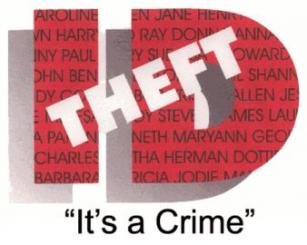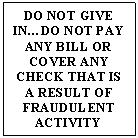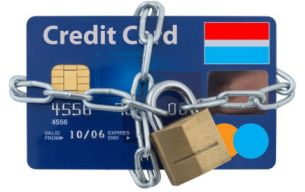Identity Theft Awareness
Sterling Police Department
This page is dedicated to increase awareness and understanding about identity theft. If you or someone you know have become a victim of identity crime, please refer to these resources:
Sterling Police Department (978) 422 - 7331 Please click here for ID Theft Packet
Federal Trade Commission (877) ID-THEFT
The Three Credit Reporting Companies:
What is ID Crime and why is it important?
ID theft is when a thief learns and uses your personal information to use your current accounts or create new ones.
Types of ID Crime:
- Identity Theft
- Credit Card/Access Device Fraud
- Check Fraud
- Bank Fraud
- False Identification Fraud
- Passport/Visa Fraud
- Social Security Fraud
What should you do if it happens to you?
- Immediately contact the 3 credit reporting companies: Experian, Equifax, and TransUnion, to ask that your file be flagged with a fraud alert (fraud alerts are placed for 90-180 days…request in writing that it be extended to seven years).
- Ask the credit bureau for the names and phone numbers of credit grantors with whom fraudulent accounts have been opened.
- Ask the credit bureaus to notify those who have received your credit report recently of the fraudulent activity.
- Fill out fraud affidavits with creditors with whom your name has been used to open fraudulent accounts.
- If existing credit cards have been used, contact creditors to be issued new account numbers and cards.
- Report the crime to your local police department.
- Contact your bank to be issued new account numbers, checks, ATM cards, etc.
- Contact the Post Office, Social Security Agency, DMV, passport office, and any other agency that you have an account with to advise them of your situation and make necessary changes to your account.
How do identity thieves learn your information?
- Stealing wallets used to be the best way to obtain personal information. While this is still common, thieves now employ more sophisticated means:
- “Dumpster Diving” is going through trash bins for intact documents containing SSNs and other personal info.
- Stealing mail from unlocked mailboxes.
- Accessing your credit report by posing as an employer, loan officer, or landlord.
- Obtaining names and SSNs from personnel or customer files in the work place.
- “Shoulder Surfing” - lingering behind people at ATM machines, credit / debit card readers and phone booths in an attempt to capture PIN numbers.
- Finding identifying information on internet sources.
- Inserting a device into a card reader that copies your credit / debit card information and PIN.
Could you be a victim? Have any of the following things happened to you?
- You received a phone call pertaining to credit accounts that you have not requested or applied for.
- You no longer receive credit card statements, financial items that you requested have not arrived, or it seems that some of your mail is missing.
- Your credit card statement requests payment for items you have not bought.
- A collection agency tells you that they are collecting for an account that you did not open.
- A payment you made by check does not credit to your account.
How can you protect yourself from becoming a victim of ID Crime?
- Do not carry your extra credit cards, Social Security card, birth certificate, or passport in your wallet or purse, except when necessary.
- Install a mailbox with a lock at your residence.
- Never toss credit card receipts in public trash containers; instead, take them with you to be shredded and disposed of in your home.
- Never leave your purse or wallet unattended at work, in church, at parties, etc.
- Immediately destroy all checks after closing an account.
- Request to pick up your new checks at the bank, rather than have them mailed to you.
- Reconcile your checking account and credit card statements in a timely manner…challenge purchases you did not make.
- Limit the number of credit card accounts that you hold and cancel inactive accounts.
- Do not give any personal information, such as your SSN or credit card number over the phone unless you can verify that the call is legitimate.
- Do not have your SSN printed on your checks.
- Memorize passwords and PINs.
- Keep a list of your credit and bank accounts so that you can quickly call the agencies to inform them of any suspicious account activity.
Can I review my credit report online for free?
AnnualCreditReport.com allows consumers to review their credit report from each of the credit reporting companies (Experian, Equifax and TransUnion). This report can be accessed once annually for free.

